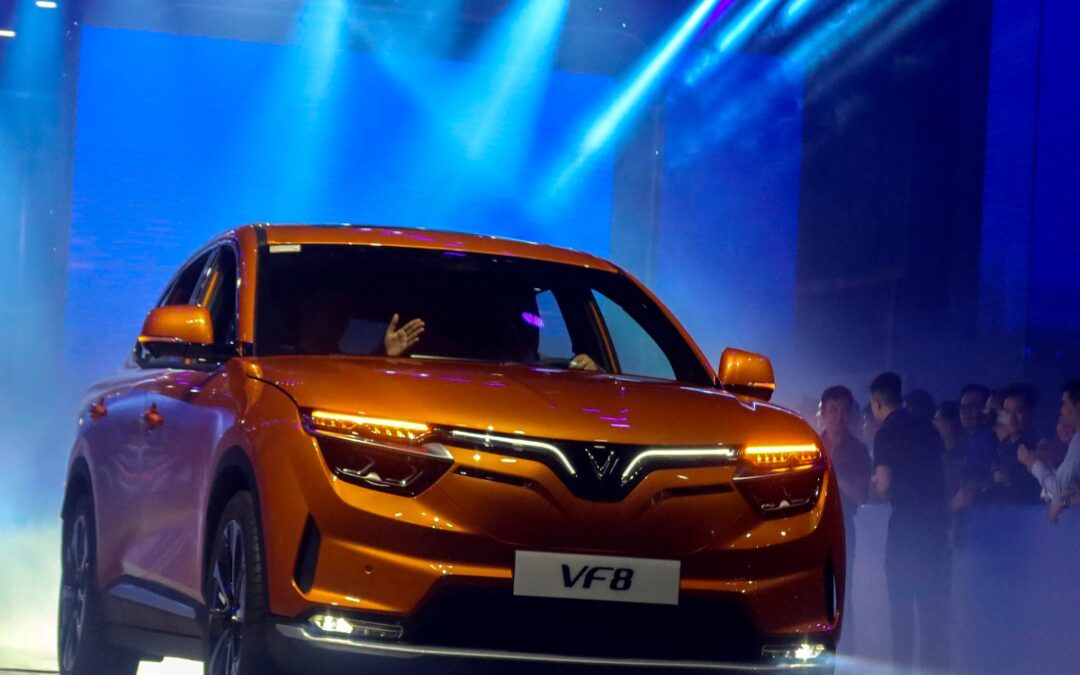A small unprofitable electric vehicle (EV) maker, which had briefly become the third most valuable auto manufacturer in the world last year after Tesla and Toyota, leaving behind General Motors and Ford Motor, as its stock rose nearly 700% days after its listing on Nasdaq, is driving into India.
VinFast Auto, which was formed in 2017 and began making EVs in 2021, is backed by Vingroup, Vietnam’s largest conglomerate. It will hold the groundbreaking ceremony for its $2-billion integrated EV facility in Thoothukudi on February 25, ET has reported based on information from sources. VinFast will set up a kit assembly plant.
VinFast, though smaller in size compared to the likes of Tesla, considers Tesla its rival. It is expanding fast and has ambitious plans to take on the Elon Musk-owned firm in the US where Tesla has more than a 50% market share. VinFast currently has a manufacturing facility in Hai Phong in Vietnam. On July 28, the company broke ground for its first American factory in North Carolina where the annual production capacity is expected to reach 150,000 vehicles in the first phase.
VinFast delivered 34,855 EVs in 2023. The EV maker has handed over a total of 42,291 electric vehicles globally since it started out in 2021.
VinFast’s India plans
VinFast enters India at a time when the EV penetration is low but the country is on its way to wide adoption.
In addition to building the manufacturing facilities in Tamil Nadu, VinFast also has intentions to inaugurate a nationwide dealership network. This approach is to establish a strong brand presence and swiftly connect with customers across the country. Since it has chosen Tamil Nadu for its plant, VonFast is also looking at exports to Southeast Asian markets.
While VinFast does not command the same brand value as Tesla, its cars are seen as affordable alternatives to Tesla and are expected to gain positive buzz in the Indian market for being cost-effective and value for money, analysts say. “Unlike Tesla, which uses a direct-to-consumer sales model, VinFast adopts a multi-channel distribution strategy and differentiates its models for various markets,” Ashwin Amberkar, automotive analyst at Canalys, had told ET last year. “VinFast is expected to adopt a similar model in India.”
VinFast might have a good opportunity in the premium segment. Premiumisation in the Indian car market presents it with an opportunity to introduce premium features at prices more competitive than Tesla and other European luxury brands like Mercedes Benz, BMW, and Audi.
VinFast might begin with two to three e-SUV models from its existing portfolio, ET had reported last year, based on information from sources. This would include a compact SUV crossover followed by a full-size sedan and more models subsequently.
The first model, VF e-34, which is a compact SUV crossover, will be an imported one, said multiple people privy to the company’s plans. The subsequent e-SUVs including VF e-36, VF6 and VF7 will be assembled locally in the initial phase before the local production of a few of them begins.
The Indian terrain
VinFast is entering India when the EV industry is very small. In 2023, sales were just 2.3 per cent of the total passenger vehicle sales, up from 2.1.28% in 2021, as per Jato Dynamics. In 2021, the sales were 0.48%.
The Indian market will be a long haul for any EV maker entering the four-wheeler segment given the current ecosystem, Barnik Chitran Maitra, managing partner at Arthur D Little, India and South Asia, had told ET. “If profitability is an issue for the electric two-wheelers, range anxiety and charging infrastructure are the challenges in the electric car segment.”
Given the muted demand, money has to be spent both on the front-end as well as back-end to get the customers excited about buying the EVs, he added.
However, this could be the right time for VinFast to enter India. Given the low entry barrier in EVs and absence of Chinese manufacturers in India, companies other than those from China have a fair chance of making it big in India, an analyst at a management consulting firm had told ET.
Tata Motors, the leader, commands a more than 80% share of India’s electric car market, and competes with China’s MG Motor and home-grown Mahindra & Mahindra.
India’s EV market has the potential to achieve over 40 per cent penetration with $100 billion revenue by 2030, as per a report by Bain & Company and Blume Ventures. The four-wheeler (cars) penetration is projected to grow to more than 20 per cent. However, several structural challenges need to be addressed to achieve this potential across five themes – new product development, go-to-market/distribution, customer segment prioritisation, software development, and charging infrastructure, the findings showed.
Meanwhile, EVs are being overtaken by hybrids in India. In sharp contrast to global trends, Indian customers prefer hybrid vehicles, which have a blend of combustion engine and electric motors, to pure-play electric cars that are powered entirely by batteries or BEVs. They like to settle for an intermediate technology and familiarise themselves with alternative fuel before going all out for EVs. Car companies, quick to recognise this trait, have been luring the Indian clientele with 51 new model launches of hybrids compared with just 29 for EVs in 2023.
Hybrids have become favourites due to their reliability, affordability and lower maintenance cost. Meanwhile, limited range, lack of charging infrastructure and expensive insurance are concerns that the EV ecosystem needs to aggressively address to make its India ride smoother.
VinFast, which will be the first EV-only company to operate in India, can have an early-mover advantage over its other global players such as Tesla which also plans to enter the Indian market due to its vast growth potential.










